Is your dog dry heaving?
Dry heaving can be due to three common issues: First, your dog’s throat is inflamed (called Pharyngitis), which basically causes a scratchy or sore throat.
Second, a nagging upper respiratory tract infection (called tracheobronchitis or kennel cough).
Third, a harmless obstruction caught in your canine’s throat that they’re simply trying to cough or vomit out.
Whatever the reasons that could be behind it, it’s something that could potentially be fatal.
So, if your dog dry heaves, is gagging, or is vomiting out nothing for a prolonged amount of time, you should consider your options, such as getting a vet’s advice as soon as possible for a proper diagnosis.
Dry heaving or gagging is a sign of another condition called GDV, or Gastric dilatation volvulus, but more about that later.
First, I’d like to help you differentiate between what can be normal coughs and something more serious.
Contact a Vet?
A veterinarian can help narrow the gagging symptoms to an exact culprit in most cases.
Visiting your vet, though, can be stressful for you and your dog, not to mention needlessly expensive.
If you’re concerned with any symptoms or complications related to your dog’s dry heaving, you can chat live with a vet or even have a quick video call for immediate answers.
You’ll learn quickly whether your dog’s dry heaving is something truly serious and what you should do to help them now.
Connect with a verified veterinarian in minutes. No waiting for appointments or office hours. No high fees. Your pet's health made convenient and worry-free.
They have been great for all of our dogs over the years. They’re easy to chat with about any issues and always give amazing guidance for the next steps.
Also, some helpful products may be to help soothe your pet and decrease or even prevent your dog from dry heaving if you want to try stuff on your own:
What Could Be the Reason Behind Your Dog Dry Heaving…
Let’s talk about why your most loyal and loving pet has been keeping you up all night with his or her constant retching and coughing.
As I mentioned, there are a few different main causes your dog may be coughing and gagging regularly. We’ll be getting in those.
Now, I know what you’re thinking…you’re a dog parent, not an aspiring veterinarian!

Well, I agree with you.
As a responsible and loving dog owner, if you know what’s normal and what’s not, you’ll know when to panic and when you should take your best friend to the doctor right away.
They say knowledge is power; this way, you’ll know the difference between a life-threatening condition like a respiratory infection (that a lot of people tend to miss) and a normal one such as a simple upset stomach due to motion sickness.
So with that, let’s look at all the different causes, what you should be looking for, and what you can do to help. Let’s go!
1. Distemper Coughs
Things to look out for:
- Dry cough
- Dog gagging
- Fever between 103 to 105 degrees
- Yellow discharge from nose and eyes
A Distemper cough is an airborne illness that your dog may have probably caught from another one of his doggy friends.
Although your dog may be vaccinated for this in his puppy years, but if you have been slacking on those yearly booster shots, then chances are your dog is dry heaving because of this.
Get this checked as soon as you can.
Okay, so now that you know what a distemper cough is all about, let’s see what you can do…
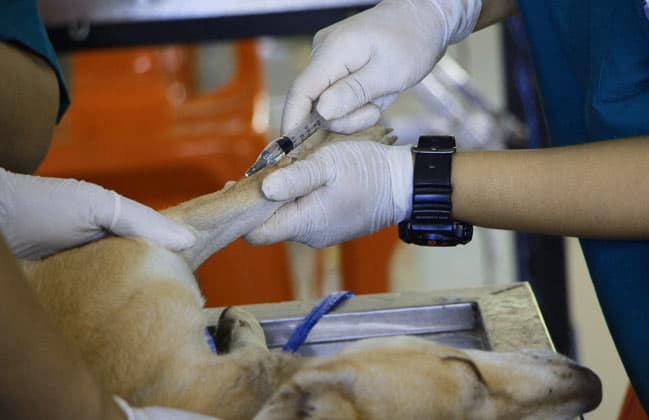
What you should do:
Well, for starters, never miss a booster shot! And also, book an appointment with your vet and visit him…
You’ll also have to deal with your dog’s pleading eyes when he realizes that you’re taking him to the vet!
If your dog doesn’t have a distemper cough but has a pattern of retching, then keep reading for more…
2. Kennel Cough
This is also known as Bordetella, which is airborne like a distemper cough caused by a bacteria called Bordetella bronchiseptica.
Now that you know the science-y stuff of this respiratory illness, let’s talk about what you should look out for:
- A cough without mucus
- Runny nose
- Sneezing
- Lethargic Doggy friend
- …..And a low fever

Kennel cough usually goes away on its own, and it can be prevented through a proper vaccine.
Anyhow, let’s go on to the next one…
3. Internal Parasites
So, I don’t know how to tell you this, but something could be living inside your dog!
Err, what!?
If you paid attention in biology class, you’d know a thing or two about parasites.
If not, I’m here!
A Little about Parasites (Because why not!?)
Well, parasites are tiny insects that live inside us (yes, even humans!).
And suck the nutrients or whatever they need out of our bodies!
Some parasites, like a leech, can ‘latch’ onto our bodies on the outside.
The Roundworm
Dogs become infected with roundworms from eating, licking soil, or anything contaminated with eggs. Like licking soil wasn’t bad enough!
Worms then travel to the lungs through your doggy’s bloodstream, reach your pet’s windpipe, and your dog swallows them, too, reaching the intestines.
So, um, what do parasites have to do with my dog dry-heaving?
Would you be upset with me if I said nothing?
Okay, I’m only kidding, don’t worry! When your furry baby is coughing because of roundworms, this means that their windpipe is irritated by the larvae, eww…
There isn’t just the roundworm, though…
Heartworm disease
Don’t worry; I’ll not go into anatomy, I promise.
I think you get the point of how this stuff works from the somewhat detailed description above. Remember, knowledge is power, right?
Other worms called Heartworms also cause coughing or gagging without any vomiting.
This parasite doesn’t allow enough oxygen in your pooch’s blood to travel to the heart and lungs, so if you ever suspect heartworm, you need to take your dog to the vet ASAP!
One note:
Another symptom of canine parasites besides a dry cough can be when your dog keeps licking its lips and swallowing.
Now, talking about parasites makes me squeamish, so let’s move on!
4. Canine Bloat
This is the most common reason and a life-threatening one when it comes to your dog’s strange coughing or gagging.
So take this one seriously, okay?
In medical terms, canine bloat is also called Gastric Dilatation Volvulus (GDV).
With GDV, your dog’s stomach fills with air, and the food inside your dog’s belly becomes distended.
Now, when torsion occurs, the stomach gets twisted on itself, which cuts off the exit routes for food, gas, and other fluids. A good vomit isn’t possible in this case.
This means that your doggy cannot throw up or belch, which leads to your dog dry heaving without passing any food or gas out.
Things you should look out for in GDV:
- A hard, swollen abdomen
- An agitation and restless doggy
- Nausea or dog vomiting white foam
- Fast breathing or excessive panting
- Pale gums
- Increase in the dog’s heart rate
- Diarrhea
- Weakness
- Drooling or nasal discharge
There are also a few risk factors that are involved when it comes to GDV.
I’m talking about them so that you don’t unnecessarily panic if your furry friend doesn’t have GDV…I mean, I’ve had a lot of panicky moments when I Google my symptoms only to find out its just momentary acid reflux and not heart disease.
I’m also talking about these so that you can seek medical help if you feel your dog may have this illness. Your dog’s health is the most important, right?
So, now let’s talk about the risk factors of GDV:
Risk Factors for Gastric Dilation Volvulus
I’ll discuss risk factors that contribute to GDV and increase your dog’s chances of developing it.
1. Large Breeds with Deep Chests
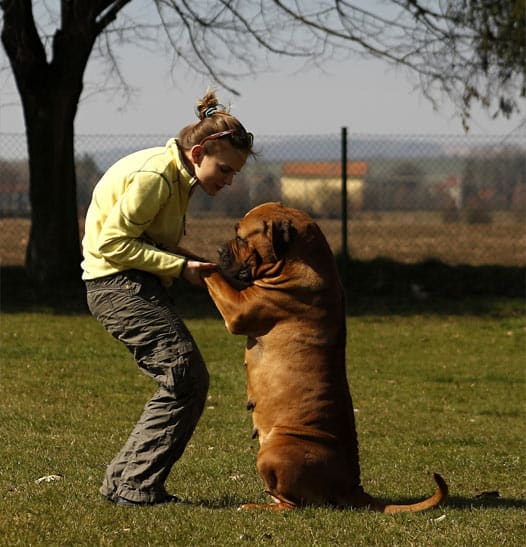
Large dogs have greater chances of developing GDV because of the structuring of their internal organs.
Breeds like The Great Dane, German Shepherd, Boxer, Labrador Retriever, Akita, Golden Retriever, etc., are at risk of developing GDV.
2. Feeding Intervals and Meal Sizes
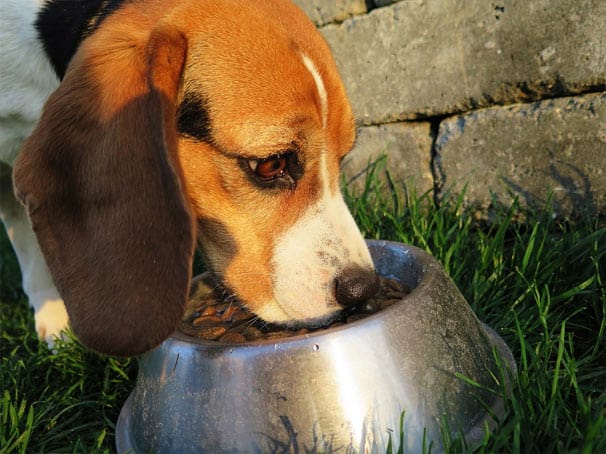
It’s true for you, and it’s also true for your pet!
Instead of giving your dog big meals that could get it coughing or gagging away, break them into smaller ones throughout the day.
If you’ve been giving your furry ball of fur two big meals instead, you may be upping the risk. So, stop!
Even I used to give mine two big meals until I read into and researched GDV.
Most dog owners don’t know much about this… Share this with as many canine parents as possible!
3. Older Dogs

Older dogs from the above-mentioned breeds have higher chances of developing GDV than younger ones and puppies.
4. Gender
For reasons unknown, males have higher chances of developing GDV than their female counterparts.
5. Life History and Pedigree
Just as many human diseases are genetically predisposed to us, dogs whose biological parents and/or older relatives have experienced episodes of GDV are more likely to develop it as well.
Also, those that have experienced gastric dilation are more likely to develop GDV.
Helpful Products for Your Pet
After reviewing all of the clinical signs, one of the following products may help your dog’s gagging issues.
Each of these products is good for helping your fur buddy, particularly their digestive system and complications that can come from eating quickly or foods they are sensitive to.
Probiotics that help the digestive tract stay healthy is a recommendation that the vet will often give to dogs with dry heaving symptoms due to digestive issues.
What Does All This Mean!?

There are several reasons why your dog is dry heaving, and I have explained a few to you in great detail.
Some reasons, like GDV, are serious and require you to take your dog to the doctor immediately.
Others aren’t as serious but may require you to see a doc anyway. Especially if you’re dog won’t eat or drink and lays around.
Perhaps your dog took a playful or unintentional strike to its throat area at the dog park. This can sometimes affect the muscles around the larynx, causing them to soften and cave in towards the trachea. The scary term is tracheal collapse.
Laryngeal paralysis can leave your dog gasping for air as its windpipe is smaller than normal.
As a dog lover, you should take away from this article that your dog’s dry heaving isn’t just unexplained retching or a cough that’ll go away on itself or something you have to live with chalked up to chronic bronchitis.
It could be very dangerous and life-threatening, so set aside that cough suppressant you hope will do the trick and seek medical advice as soon as possible for your dog’s dry-heaving symptoms!
Leave comments if you want to know more about dry heaving, or share your own story.

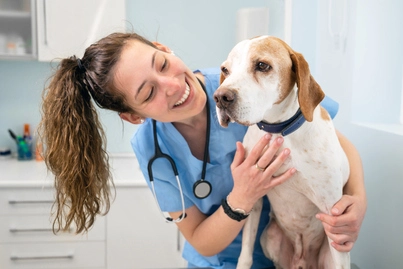
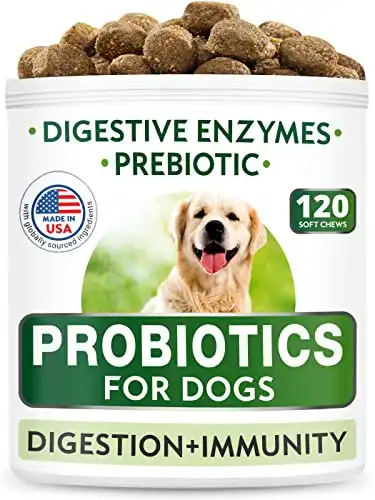

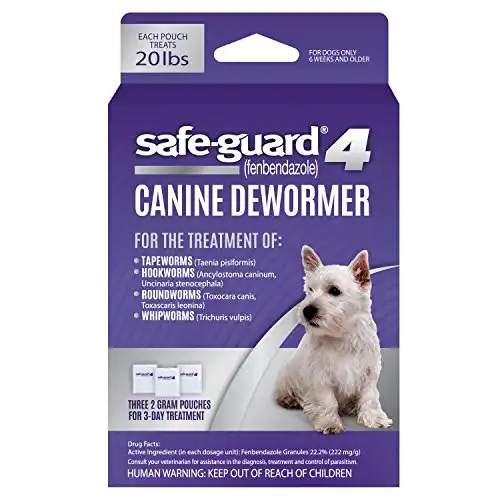
I thought that my dog dry heaving wasn’t a huge deal! But the distemper cough point made me feel otherwise.
Thank you
Dearest You,
Hi 🙂
I have taken my dog to the vet 3x in the last month but still not diagnosed nor fixed the dry heaving issue (he was heaving alot that first day & acting sick, no energy & unable to eat or drink)..?!!?.. There was apparently a lot of gas in him that needed to be dispelled which I think/hope is now treated as I’ve switched him from the vet prescribed famotidine to Pepto bismol & pepcid ac (rotate daily to be safe/thorough) which made a very noticeable difference since about 8-12hrs after switch.
Vet tests include; blood work, x-ray, ultrasound, physical exam & medication (famotidine, tramadol, sulcrate & he was switched to apoquel for his allergies 2wks prior to these issues). All results came back “normal”!!??? & Vet advised me there was only one test left undone, scoping his throat, which meant I’d have to take him to different office as she wasn’t equipped for it, however she did say that they not only x-rayed but also (apparently) did untrasound on his throat & she didn’t see anything (&as she explained wit ultrasound if there was a growth or tumor she should have seen it as there would be gas or something blocked in front of it..?. however his belly was shaved for the ultrasound, but not his neck..???..so I am very confused)..
My dog is 11yr old mix Rot/Sheppard (& some lab I believe).
His gas issue appears to be under control wit what I’m giving him however he is still dry heaving about 3 to 10+ times per day..
He has allergies & has been on hypoallergenic Royal Canin food for several years & I’ve just recently (3mts ago) rescued a cat which meant that I had to find very creative ways to keep cat food out of his reach but otherwise his diet/environment hasn’t changed..
Please help? I don’t know what to do & spending another few thousand dollars for poss no results is something I must avoid if at all possible.. it has been very trying financially as I am single with very limited income. But I love my dog , well now rather my pets, so will do what must be done obviously..
Had something similar happen to our 12 year old lab/standard poodle mix. It ended up being congestive heart failure which they diagnosed very quickly. He was put on 2 different meds and his symptoms improved almost overnight. He does have to be on meds the rest of his life. The meds are much cheaper if you have the prescription sent over to a Walgreen or Walmart (they fill for pets too :)).